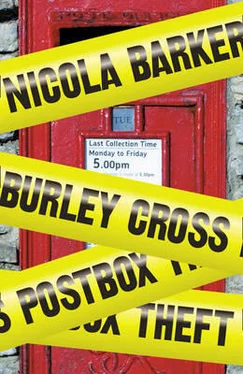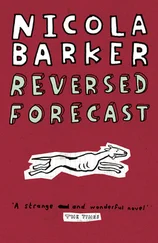Mhairi told you — she insisted, she promised — that the letter she had found was already torn open, but you knew that it wasn’t, didn’t you? Because when you stole those letters you didn’t think of opening them. Not even for a second (you’re far too scrupulous, too honourable for that!).
Although you were angry, weren’t you? Underneath your studied veneer of cheery professionalism? Angry about a lot of things (not that anybody would have guessed it — with your open smile, your easy hospitality, your ready line in casual chitchat…).
You were angry that Duke was gone, that he’d been taken from you, so cruelly. You were angry that he’d left you in a state of such crippling debt (from all those expensive renovations, instigated, in the main, because of that ridiculous feud of his — that pointless rivalry — with Baxter Thorndyke). You were angry after the burglary (and with good reason, too. The mess those vandals made of the newly refurbished bar! So cruel! So pointless! So unnecessary!). You were angry when your insurance premiums sky-rocketed. Angry that Timmy Dickson pretty much got away with it (after turning in crucial evidence on another, unrelated — but apparently more ‘serious’ case — and plea-bargaining with the judge).
You were angry about how long it took you to get back on to any kind of an even financial keel after the police confiscated a series of cheques and other critical pieces of documentation as ‘evidence’ (because Sergeant Everill had developed a — completely stupid and erroneous — theory that the whole thing might actually be ‘an inside job’).
And then, when it felt like you might finally be getting back on track again, that stupid riot after the darts tournament! The ruinous headlines in the papers! Your insurance premiums virtually doubling overnight! Harsh words from the brewery! All those bills! All that stress! Baxter Thorndyke sticking his boot in at every available opportunity…
It wasn’t just important, now, but imperative that trade should improve in the run-up to Christmas. You were already living hand to mouth — so desperate, indeed, to make ends meet that you had actively started encouraging coach parties (even though a large proportion of the village was dead set against it). That huge stink over the damage to grass verges! Ridiculous! Exhausting!
And then last, but by no means least (the icing on the cake): that hyperactive Coombes kid tampering with the mechanism of Duke’s prized grandfather clock! (Duke’s beloved clock! Its steady, regular tick, representing for you — for all of us — the life and breath of The Old Oak.)
You wanted to throw in the towel that night, didn’t you? That night of the Coombes family Auction of Promises dinner? Standing there, all alone, in the snug, tears running down your cheeks, the carpet around you scattered with a terrifying array of nuts and bolts and springs and gears and wheels…
But you couldn’t throw it in, no matter how much you wanted to. You couldn’t give up on Duke’s dream. You couldn’t let Thorndyke get the better of you both. You simply couldn’t let that bastard win!
But cash was so short, wasn’t it? So short, in fact, that you found yourself doing something you thought you could never, ever stoop to. You found yourself borrowing from the charity box (just briefly, just temporarily, just a harmless, spur-of-the-moment thing). You’d been placed in charge of the Auction of Promises budget after Prue dashed off on her mercy mission to France. And then there was the bridge night — the money raised for that donkey sanctuary in Cairo…
Good old Wincey, trusty old Wincey, so ashamed of having temporarily pocketed the charity cash that she ducks behind a car on seeing Sebastian St John and Unity Gray idly chatting outside the post office together. Not because you’re angry with Unity (for the darts comp. catastrophe). No! Not at all! But because you’re crippled with embarrassment. You can’t bear the thought that they’re going to ask (for the third time, the fourth time) if you’ve managed to bank that infernal charity money, yet.
You can’t bank it — it’s impossible — because there’s not a penny of it left (and not so much as a bean remaining in your account to cover the debt!). But then that awful look of humiliation on Unity’s old face! You hadn’t managed to duck quite soon enough (she saw! She’d noticed!). So you quickly pretend you’ve dropped something (what? A coin? A bangle? A stamp?), that it’s rolled down into the road and you’re simply trying to retrieve it. You scrabble around in the gutter for a while, then you turn and you make a rapid bee-line for… Where? Anywhere! The church!
You dash inside, mortified. You lean against a back wall, peering around you in the half-gloom, catching your breath. Your eyes alight on a bank of candles, flickering, comfortingly, in a far corner. You smell the scent of flowers. It feels different in the church. Warmer. You’ve not been inside the place since Duke’s funeral — which Reverend Horwood hijacked with some horribly inappropriate hell and damnation diatribe (about the social ills caused by alcohol). You swore you’d never enter its dark portals again after that.
But here you are, just the same. You’re staring at the bank of candles and feeling strangely — unwittingly — drawn towards them, so you go and sit down on a pew. You’re desperately sad — desperately alone. You inspect the exquisitely embroidered knee-rest for a while. You close your eyes. You rest your forehead, lightly, on the back of the pew in front. You find yourself whispering a little prayer. Your tensed muscles gradually begin to relax. You feel a sense of lightness, of peace, a brief moment of comfort, even…
But then your reverie — your brief, blissful idyll — is cruelly destroyed as a loud commotion breaks out directly behind you. Suddenly the church is full of people — full of argument and rancour. Reverend Paul is there, and Reverend Horwood, and several of Reverend Horwood’s ‘ladies’, and Reverend Paul (usually so quiet and unassuming) is shouting at Reverend Horwood for displaying a crucifix in the church foyer without first seeking his prior permission.
You’re appalled by this scene — jolted by it — disorientated — and you quickly rise to your feet and flee the building. You’re in such a hurry to get out of there that you leave your gloves and your scarf behind you. Yet the gloves and the scarf aren’t the only things you miss in your rush. You miss something else — something you couldn’t really be expected to notice, but something significant, even momentous…
Rhona Brooks (one of Reverend Horwood’s ‘ladies’, his most loyal acolyte) is also in attendance. You and Rhona have never been close. Rhona doesn’t drink. She’s very morose, very dowdy, very devout. She doesn’t socialize much. You have nothing in common with her. But when that argument takes place between the new reverend and the old, and she sees you suddenly quit the church, Rhona notices your distress (your gloves and your scarf left behind on the pew), and something gives way inside her. A tiny shift takes place. A little knot of doubt enters her staunch, puritanical heart. She starts to question herself. She starts to wonder…
She plays the scene over — again and again — in her mind: the sight of you, Wincey Hawkes, the old publican’s wife, cowering in the corner, hoping to find comfort in front of that flickering bank of candles (that frivolous bank of candles which Reverend Horwood disapproves of so much). She sees (not just sees, but feels , each time she replays the scene in her head), that palpable sense of hurt felt by the new reverend (the sense of betrayal), the atmosphere of contempt — of rage, even — emanating from the old (but… but it was only a little joke, wasn’t it, after all? The carving? Edo’s carving? Nothing more than that? Nothing serious? Nothing critical? Just a quick, mischievous yank on the tiger’s tail?).
Читать дальше
Конец ознакомительного отрывка
Купить книгу












